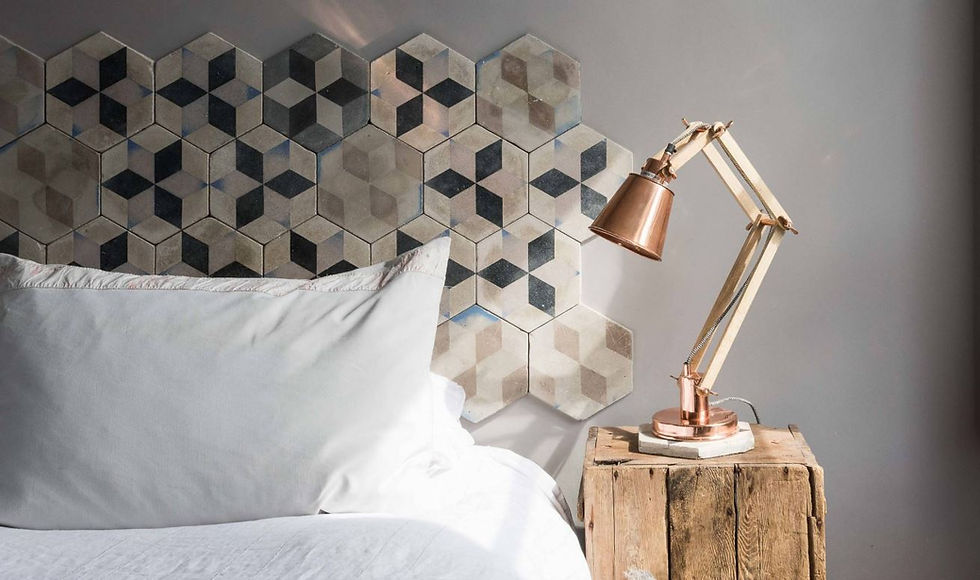Does interior design improve wellbeing?
- Lisa Christie

- Dec 10, 2020
- 4 min read
As the pandemic forces us to re-evaluate our homes, can interior designers help us build a better world or have a better life?

By definition, the role of an interior designer is to create beautiful, comfortable and functional interiors by manipulating space, layout, light, colour, materials and furniture – all while keeping clients’ wishes and constraints front of mind. But are interior designers essential? As pandemic-containment measures prioritise goods and services that are deemed to be essential for society, this question gains new priority.

Interior designers make our lives better
I like to think that my work improves my clients' quality of life. Our surroundings have an enormous impact on the way we behave and feel and I feel that my role is more important than ever as we retreat to our homes. A good interior designer will resolve the functionality of a space and address scale, curate a desirable aesthetic, inject soul and tell a story for the inhabitants as well as increasing the productivity of the occupants. Good interior design evokes happiness and soothes the soul. It can inspire confidence, empathy, pride, creativity, security and energy.
Our eyes need visual harmony of colours, shapes and we need adapted ergonomics. We have square metres, which we are at our disposal. Our work is therefore to find solutions to make these square metres more liveable, notably giving the impression of spaces that make more sense and are much easier to live in.
2020 has been a very busy year for Visual Edge! It has seen a dramatic increase in domestic projects both large and small with a slight back off on commercial projects.
The world will continue to work from home well after the pandemic is over
A dramatic increase in converting spaces to allow for the ever increasing 'work from home' requirement. This has meant a change of ideology and of course a reassessment of the use of spaces at home. I myself have worked from home for nearly 20 years. I therefore feel well equipped to advise on best practice on an aesthetic level but also for maximum practicality. Combining work with home life is not for the faint hearted and getting it right is important for its ultimate success.

Are you missing your office desk or are you not quite getting the hang of this work from home arrangement? A professional designer can assess your home with a fresh eye and advise you on the best way to achieve the best possible work from home space after considering the whole family's needs. Creating a meaningful space that fulfils the needs of the inhabitant and optimises their space is one of our key roles as designers and is essential to our society.
Getting it right for the client is so important!
It’s not about whether the walls are painted in the latest colours, but rather whether the space evokes the desired emotions in the user. Getting to know the client is super important and intuition can play a large part in that too. Sometimes the client changes their mind or is influenced by the research so adapting to that and finding clarity is what is needed to get back on track. Also understanding how small changes can effect the overall balance of the space. There is so much choice out there! People are less and less inclined to follow fads and trends. More so, I am encouraging my clients to tap into their own creativity rather than take a leaf out of a design magazine and try to replicate it in their own home. This is something that rarely results in something meaningful for the client. Every space has its own unique opportunities so understanding the design principles like a second language is what it takes to provide good advice.
Getting to know my client, their goals, personality and their lifestyle plays a large part, good listening and communication skills are paramount to achieving the best outcomes both aesthetically and functionally.

Good designers Inspire their clients
Does the proposed design entice, stimulate, relax, entertain, embrace, fascinate? Good design achieves this through the manipulation of space, light, colour, materials, textures, furniture, and myriad other elements. Ultimately all this works together in a delicate balance of form and function. And this is important because it improves our quality of life. I have seen this over the past 20 years of professional designing and it keeps me inspired to continue with my practice.
Good design strategy contributes to our well being
The professional interior designer has a great knowledge of materials, visualisation skills and a perspective on spaces and colours as a result of their research, experience and training.
The human element is essential to interior designers and they can have a profound impact on the person and their life.

Interior design can be therapeutic when it is shared with a client. I think that it is essential in order to create a sense of wellbeing in the home, to put together interiors where one can find oneself again and to create suitable spaces for the specific people that inhabit them. It is not something vital, but it is necessary for wellbeing. The therapeutic role of interior design is in creating wellbeing while representing the client’s ideas in material form. If this is done well, the clients are very happy because they recognise themselves in the designers work. I do everything I can to create the client’s universe.
That's about all I've got for now....
Take care everyone and enjoy your Christmas break! Love and appreciate your family and tell them how much they mean to you...
A good ole fashioned Merry Christmas to you all from me!
Lisa









Comments